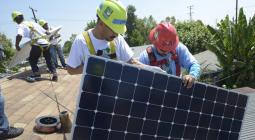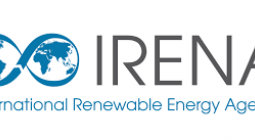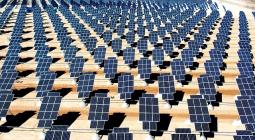SDG7: World falling short on global clean energy goals.
Sustained efforts are needed to deploy more renewables and improve electricity access for world's poorest, progress report warns
Without a step-change in global efforts to improve electricity access, deploy more clean energy generation capacity, boost energy efficiency, and scale up the use of clean cooking technologies, the world will not meet its 2030 sustainable energy goals, a major new report has warned this week.
While the number of people living without electricity has dropped sharply from 1.2 billion in 2010 to around 840 million in 2016, based on the current rate of progress there will still be 650 million left unplugged in 2030, leaving the world well short of the UN's Sustainable Development Goals (SDG) and their specific target to deliver universal energy access by the end of the next decade while still complying with the emissions reduction trajectory set out by the Paris Agreement.
Meanwhile, progress on clean energy deployment is similarly off-track the report warns. Renewables accounted for 17.5 per cent of global total energy consumption in 2016, but there remains a long way to go before energy systems around the world are sustainable, the report concludes.
The progress report was compiled by the International Energy Agency (IEA), the International Renewable Energy Agency (IRENA), the United Nations Statistics Division (UNSD), the World Bank and the World Health Organization (WHO), and assesses progress against Sustainable Development Goal 7, which sets a range of targets for delivering sustainable energy for all.
SDG7's sub targets include delivering universal energy access by 2030, doubling the global rate of energy efficiency improvement, and increasing "substantially" renewables' share of the global energy mix.
Despite some encouraging progress in recent years, more must be done to put the world on track to meet SDG7, said Dr Fatih Birol, executive director of the IEA. "I am particularly concerned by the dramatic lack of access to reliable, modern and sustainable energy in certain parts of the world, especially in sub-Saharan Africa, a region where we need to really concentrate our efforts," he said.
Around 89 per cent of the global population now has access to electricity, but the report warns that those who lack reliable power supplies are among some of the poorest and hardest to reach households. Off-grid solutions, including home solar systems and mini-grids, will be necessary to bridge the energy gap, the report warns.
Meanwhile, the number of people without access to clean cooking facilities has fallen slowly, from 2.96 billion in 2010 to 2.9 billion in 2016. The disappointing pace of progress means 2.2 billion people are expected to still be cooking on dirty stoves, and facing the ensuing health impacts, by 2030, the paper concludes.
"Targeted actions should be taken to prevent some four million deaths per year particularly from pneumonia, heart disease, stroke, lung disease and cancer, attributed to household air pollution," said Dr Maria Neira, director at the WHO. "Although challenging, fast progress can be achieved through political and financial commitment towards expanding access to reliable and affordable supply of clean cooking solution."
The report is the latest in a series of studies to warn renewable energy deployment is still lagging behind whatis needed to avert dangerous climate change, with many countries still facing renewable energy shares in the low single figures. Earlier this year a damning assessment from the World Economic Forum warned there has been "almost no progress" in greening the world's energy systems over the last five years, with far too many countries still relying on coal power. A similar study from the IEA earlier this month warned global renewables deployment stalled last year, as policy changes and economic concerns undermined investment.
Further worrying news is provided by energy efficiency progress, with this week's report warning the annual rate of energy efficiency improvement still lags behind the 2.7 per cent a year target needed to meet SDG7. To make matters worse, early figures from 2017 and 2018 suggest the rate of improvement has slowed down in recent years, to just 1.3 per cent in 2018.
"Concerted policy efforts" such as strengthening mandatory energy efficiency policies and providing targeted incentives, are urgently needed to drive up the pace of change, according to the report.
"Despite the advancements towards Goal 7, progress is insufficient to meet the 2030 Agenda's energy-related goals and targets," concluded Stefan Schweinfest, director at the UNSD.
23 May 2019




